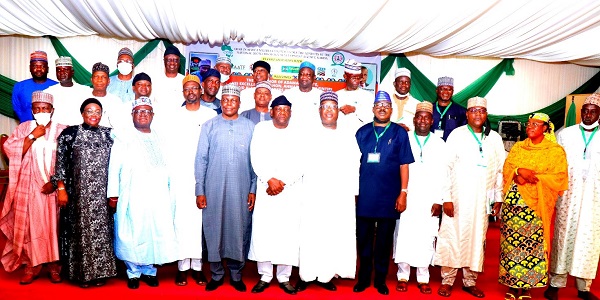…Trains extension workers, farmers, media

The Nigerian chapter of the Open Forum on Agricultural Biotechnology (OFAB) in Africa has said it will move into northeastern Nigeria to tackle the incidence of food insecurity that has affected over 8.7 million people in the region and left 320,000 children acutely malnourished, as shown by recent statistics from the United Nations World Food Programme (WFP).
According to OFAB, it will work under the auspices of the National Biotechnology Development Agency (NABDA) to provide adequate information on new modern biotechnology practices and other emerging technologies which have the potential to address food insecurity.
To this end, OFAB held a two-day capacity-building programme for selected journalists, farmers and extension workers across the seven states in the region.
The training was aimed to create public awareness about the opportunities and challenges presented by biotechnology development and promote dialogue amongst scientists, the biotechnology industry, policymakers and the public. This is because modern biotechnology can be an effective tool for increasing agricultural productivity and facilitating economic growth.
The director-general, NABDA, Prof. Abdullahi Mustapha, while speaking on the first day of the training, reiterated the capability of modern biotechnology to revolutionise agricultural practices while protecting the environment. Biotechnology, he said, is offering the northeast a second chance to revive its agriculture.
Through the training, the media and extension workers were prepared to be part of this journey as they assist the farmers in working towards having a food secure Nigeria.
He told the participants that Nigeria has advanced in technology adoption, being the first country in the world to release the Pod Borer-Resistant Cowpea and the second in Africa to release TELA maize which is drought-tolerant and insect-resistant.
The country coordinator, OFAB Nigeria, Dr. Rose Gidado emphasised that the capacity-building programme brought together journalists, farmers and extension agents from the Northeast to Yola, Adamawa, with the intent that the participants would become GM Ambassadors. This would bring economic benefits to the region and the nation.
Gidado listed the benefits of modern biotechnology to include increased crop productivity and farm income gains, conserving biodiversity by saving up to 183 million hectares of land, reducing carbon dioxide equivalent to removing 1.67 million cars off the road for 1 year, poverty alleviation through the upliftment of farmers and provision of a solution to most agricultural, medical and industrial challenges facing the world today.
Also, the director-general of the National Biosafety Management Agency (NBMA), Dr. Rufus Ebegba, called the participants to discountenance all misconceptions being touted against modern biotechnology as it is safe and capable of addressing food insecurity challenges.
The regional director, African Agricultural Technology Foundation (AATF), Dr. Issoufou Kollo, called those against biotechnology adoption “people pulling Nigeria to the stone age” and those who “do not want to see Nigeria and Africa attain food security”.
In his address, the state governor, Hon. Ahmadu Umaru Fintiri, said biotechnology is giving the northeast zone a second chance to revive her agricultural sector. He described the state as agrarian and known for cotton, soybeans, yams, sorghum, sugar cane, groundnut, rice, cowpea and maize cultivation. “Absence of adequate technologies, insecurity, among others, have eroded their zeal and impeded farming activities in the northeast, hence the dire need for urgent intervention with emerging technologies like biotechnology,” said the governor, who was represented by his deputy, Chief Crowther Seth.
During the technical session on the second day of the training, while speaking on ‘Nigeria Media Landscape: Why the Media Must Focus on Development-oriented Issues,’ Godwin Atser of the International Institute of Technology in Agriculture (IITA) Ibadan, said biotechnology is a tool that can improve the prosperity of the continent and tasked journalists on professional reportage of the sector.
On his part, commissioner of land and housing, Jigawa State and former director, Information Resource Centre, US Embassy Abuja, Sagir Musa Ahmed, who made a presentation on ‘Advanced Internet Search for Global Perspectives News Reports Writing’ noted that biotechnology is the key technology of the 21st century and journalists must report accurately while making use of the internet in sourcing for information.
The communications officer, AATF, Alex Abutu, made a presentation on “Communicating About Biotechnology: From Lab to Market” in which he maintained that the media is in the best position to disseminate the right information to the public in such a way that it would be understood without panic or fear. Biotechnology, he said, has solved many problems cutting across health, food, water etc., but is controversial. He enjoined journalists to “check facts” before reporting.
The editor Africasti.com, Bishop Onche Odeh, who spoke on ‘Why Report on Biotechnology?’ urged journalists to take advantage of the leadership role Nigeria is playing in biotechnology and put the country on the global map and in a positive light. Biotechnology, he said, is relatively new and it is the media’s responsibility to balance the narrative.
In a related development, the head, public relations unit, LRCN, Mrs. Ngozi Oboh, who made a presentation on ‘Tips for Writing Impactful Science-based Stories’, called on journalists to always remember the ‘rule of the thumb of media practice’ which is to inform, educate and entertain using various platforms – traditional or social media. Oboh told the participants to look out for credible sources when reporting science to access authoritative information.
Others who participated in the programme were the Secretary to the Adamawa State Government, Malam Bashir Ahmed; Chief of Staff to the Adamawa State Governor, Prof Maxwell Gidado, SAN; Head of Service, Adamawa State Government, Dr. Edgar Amos; Commissioner for Agriculture, Alhaji Umar Daware; Attorney General and Commissioner for Justice and other commissioners in the state.
Resource persons at the event included the director, Federal Department of Extension Services, Federal Ministry of Agriculture and Rural Development, Abuja, Engr. Frank Satumari; Country coordinator, Programme for Biosafety Systems (PBS), Dr. Mathew Dore; Deputy director, Federal Ministry of Agriculture and Rural Development, Mr. Yerima Ubah; Mr. Abdul Hassan of the National Agric Seed Council (NASC) and the director, agricultural biotechnology department, Dr. Nasiru Ibrahim.

